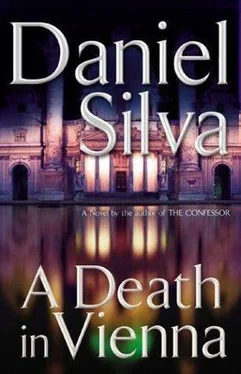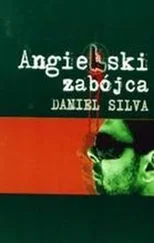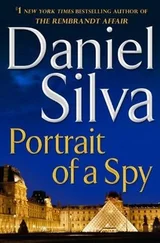“How much do you know about what happened to my mother during the war?”
Shamron’s calculated look, delivered over the rim of a coffee cup, made it plain there was nothing he did not know about Gabriel’s life, including what had happened to his mother during the war. “She was from Berlin,” Shamron said. “She was deported to Auschwitz in January 1943 and spent two years in the women’s camp at Birkenau. She left Birkenau on a death march. Unlike thousands of others, she managed to survive and was liberated by Russian and American troops at Neüstadt Glewe. Am I forgetting anything?”
“Something happened to her on the death march, something she would never discuss with me.” Gabriel held up the photograph of Erich Radek. “When Rivlin showed me this at Yad Vashem, I knew I’d seen the face somewhere before. It took me awhile to remember, but finally I did. I saw it when I was a boy, on canvases in my mother’s studio.”
“Which is why you went to Safed, to see Tziona Levin.”
“How do you know?”
Shamron sighed and sipped his coffee. Gabriel, unnerved, told Shamron about his second visit to Yad Vashem that morning. When he placed the pages of his mother’s testimony on the table, Shamron’s eyes remained fixed on Gabriel’s face. And then Gabriel realized that Shamron had read it before. TheMemuneh knew about his mother. TheMemuneh knew everything.
“You were being considered for one of the most important assignments in the history of the Office,” Shamron said. His voice contained no trace of remorse. “I needed to know everything I could about you. Your army psychological profile described you as a lone wolf, egotistical, with the emotional coldness of a natural killer. My first visit with you provided confirmation of this, though I also found you unbearably rude and clinically shy. I wanted to know why you were the way you were. I thought your mother might be a good place to start.”
“So you looked up her testimony at Yad Vashem?”
He closed his eyes and nodded once.
“Why didn’t you ever say anything to me?”
“It wasn’t my place,” Shamron said without sentiment. “Only your mother could tell you about such a thing. She obviously carried a terrible burden of guilt until the day she died. She didn’t want you to know. She wasn’t alone. There were many survivors, just like your mother, who could never bring themselves to truly confront their memories. In the years after the war, before you were born, it seemed as though a wall of silence had been erected in this country.The Holocaust? It was discussed endlessly. But those who actually endured it tried desperately to bury their memories and move on. It was another form of survival. Unfortunately, their pain was passed on to the next generation, the sons and daughters of the survivors. People like Gabriel Allon.”
Shamron was interrupted by Gilah, who poked her head into the room and asked whether they needed more coffee. Shamron held up his hand. Gilah understood they were discussing work and slipped back into the kitchen. Shamron folded his arms on the table and leaned forward.
“Surely you must have suspected she’d given testimony. Why didn’t that natural curiosity of yours lead you to Yad Vashem to have a look for yourself?” Shamron, greeted only by Gabriel’s silence, answered the question for himself. “Because, like all children of survivors, you were always careful not to disturb your mother’s fragile emotional state. You were afraid that if you pushed too hard, you might send her into a depression from which she might never return?” He paused. “Or was it because you feared what you might find? Were you actuallyafraid to know the truth?”
Gabriel looked up sharply but made no reply. Shamron contemplated his coffee for a moment before speaking again.
“To be honest with you, Gabriel, when I read your mother’s testimony, I knew that you were perfect. You work for me because of her. She was incapable of loving you completely. How could she? She was afraid she would lose you. Everyone she’d ever loved had been taken from her. She lost her parents on the selection ramp and the girls she befriended at Birkenau were taken from her because she would not say the words an SS Sturmbannführer wanted her to say.”
“I would have understood if she’d tried to tell me.”
Shamron slowly shook his head. “No, Gabriel, no one can truly understand. The guilt, the shame. Your mother managed to find her way in this world after the war, but in many ways her life ended that night on the side of a Polish road.” He brought his palm down on the table, hard enough to rattle the remaining dishes. “So what do we do? Do we wallow in self-pity, or do we keep working and see if this man is truly Erich Radek?”
“I think you know the answer to that.”
“Does Moshe Rivlin think it’s possible Radek was involved in the evacuation of Auschwitz?”
Gabriel nodded. “By January 1945, the work of Aktion 1005 was largely complete, since all of the conquered territory in the east had been overrun by the Soviets. It’s possible he went to Auschwitz to demolish the gas chambers and crematoria and prepare the remaining prisoners for evacuation. They were, after all, witnesses to the crime.”
“Do we know how this piece of filth managed to get out of Europe after the war?”
Gabriel told him Rivlin’s theory, that Radek, because he was an Austrian Catholic, had availed himself of the services of Bishop Aloïs Hudal in Rome.
“So why don’t we follow the trail,” Shamron said, “and see if it leads back to Austria again?”
“My thoughts exactly. I thought I’d start in Rome. I want to have a look at Hudal’s papers.”
“So would a lot of other people.”
“But they don’t have the private number of the man who lives on the top floor of the Apostolic Palace.”
Shamron shrugged. “This is true.”
“I need a clean passport.”
“Not a problem. I have a very good Canadian passport you can use. How’s your French these days?”
“Pas mal, mais je dois pratiquer l’accent d’un Quebecois.”
“Sometimes, you frighten even me.”
“That’s saying something.”
“You’ll spend the night here and leave for Rome tomorrow. I’ll take you to Lod. On the way we’ll stop at the American Embassy and have a chat with the local head of station.”
“About what?”
“According to the file from the Staatsarchiv, Vogel worked for the Americans in Austria during the occupation period. I’ve asked our friends in Langley to have a look through their files and see if Vogel’s name pops up. It’s a long shot, but maybe we’ll get lucky.”
Gabriel looked down at his mother’s testimony:I will not tell all the things I saw. I cannot. I owe this much to the dead…
“Your mother was a very brave woman, Gabriel. That’s why I chose you. I knew you came from excellent stock.”
“She was much braver than I am.”
“Yes,” Shamron agreed. “She was braver than all of us.”
BRUCE CRAWFORD’S REAL occupation was one of the worst-kept secrets in Israel. The tall, patrician American was the chief of the CIA’s Tel Aviv station. Declared to both the Israeli government and the Palestinian Authority, he often served as a conduit between the two warring sides. Seldom was the night Crawford’s telephone didn’t ring at some hideous hour. He was tired, and looked it.
He greeted Shamron just inside the gates of the embassy on Haraykon Street and escorted him into the building. Crawford’s office was large and, for Shamron’s taste, overdecorated. It seemed the office of a corporate vice president rather than the lair of a spy, but then that was the American way. Shamron sank into a leather chair and accepted a glass of chilled water with lemon from a secretary. He considered lighting a Turkish cigarette, then noticed the NO SMOKING sign prominently displayed on the front of Crawford’s desk.
Читать дальше












